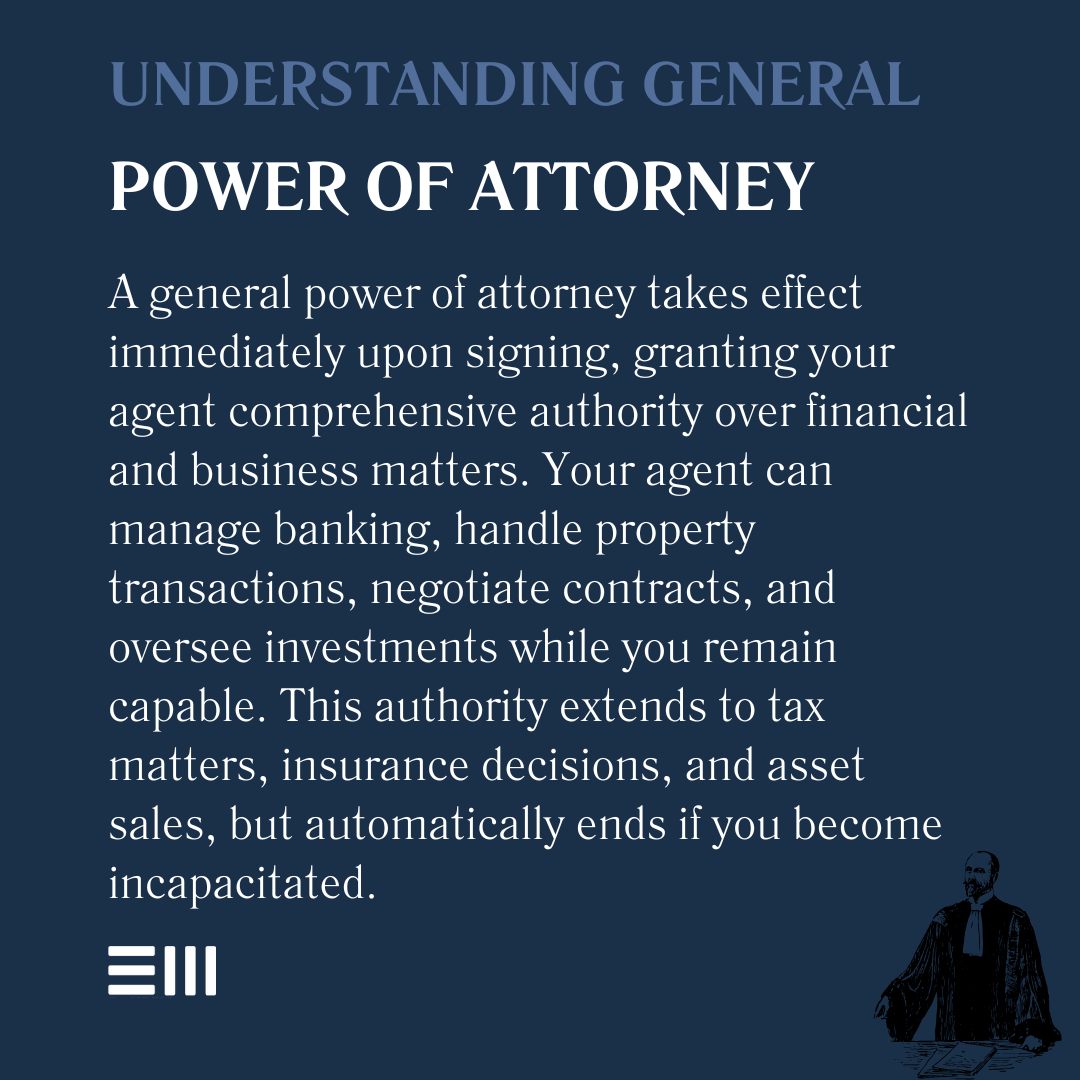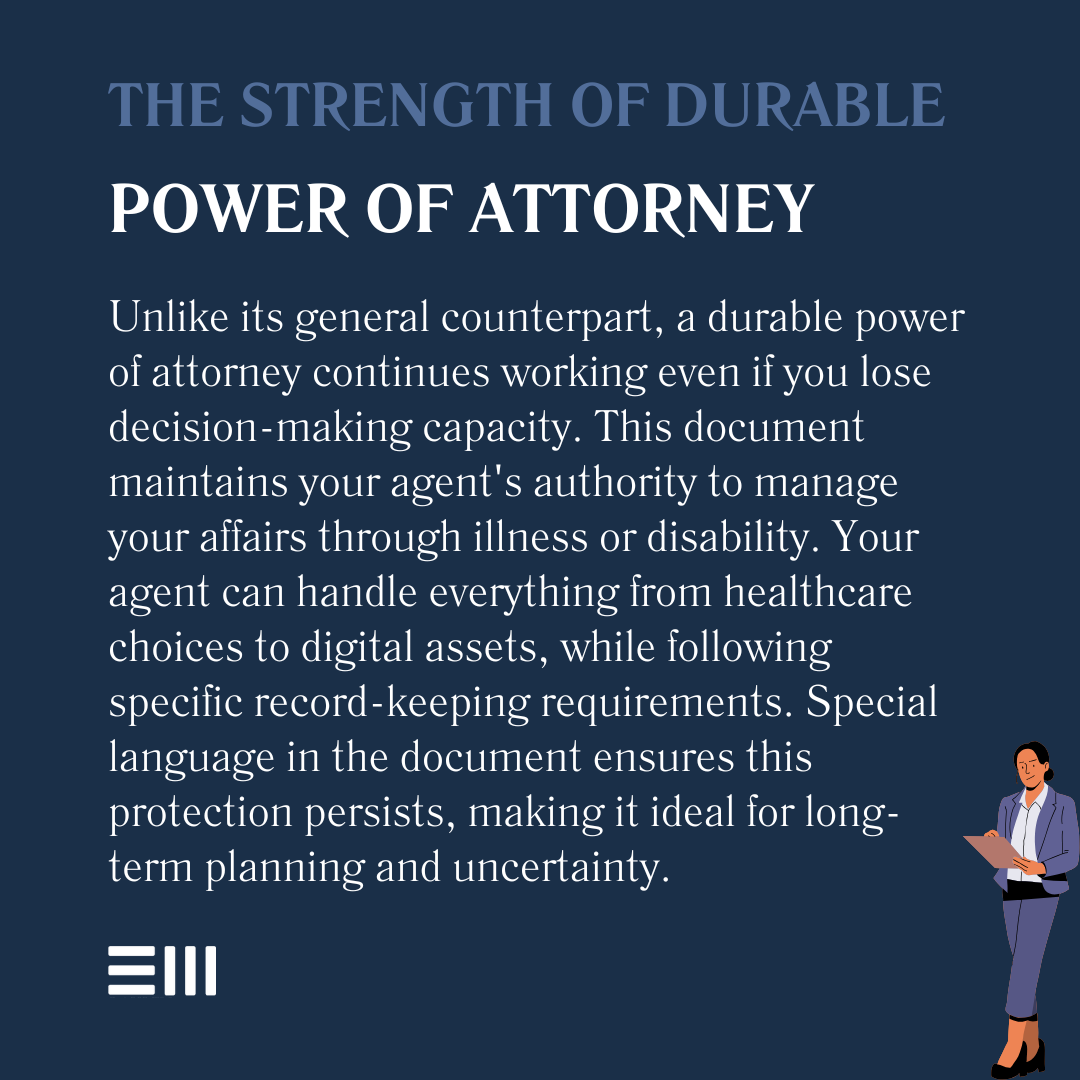A general power of attorney can be a valuable tool for managing financial and legal affairs when an individual is unable to do so themselves.
Across Alabama, families discover too late that the type of power of attorney they choose can mean the difference between seamless care and costly court battles.
Many find themselves navigating guardianship proceedings that could have been avoided with the right initial choice.
Understanding the Core Differences
The distinction between durable and general powers of attorney fundamentally shapes how these documents serve you and your family.
While both types grant authority to act on your behalf, their effectiveness under different circumstances varies significantly. The right choice depends on your unique situation and long-term objectives.
Key Features of General Power of Attorney
A general power of attorney provides broad authority to handle your affairs but comes with specific limitations that affect its practical use.
Understanding these features helps determine if it matches your needs and circumstances.
- Broad authority over financial matters;
- Immediate effect upon signing;
- Terminates upon incapacity;
- Flexible revocation options;
- Business transaction authority;
- Property management powers;
- Banking and investment control;
- Contract negotiation rights;
- Tax matter handling;
- Insurance policy management;
- Debt payment authorization; and
- Asset sale capabilities.
The scope of authority in a general power of attorney offers significant flexibility while you retain capacity, making it suitable for many temporary situations.
Key Features of Durable Power of Attorney
Durable power of attorney builds upon the general power framework with crucial additions that extend its effectiveness. These features provide additional protection in challenging circumstances and long-term situations.
- Continues through incapacity;
- Specific durability language required;
- Immediate or springing effect options;
- Same broad authority as general POA;
- Healthcare decision inclusion possible;
- Clear termination specifications;
- Succession planning options;
- Record-keeping requirements;
- Regular review provisions;
- Family notification protocols;
- Digital asset management; and
- Long-term care planning.
The durability provision makes this document more resilient to life's uncertainties and better suited for comprehensive estate planning.
Impact on Estate Planning
The choice between general and durable power of attorney significantly affects your overall estate planning strategy.
Understanding these implications helps create a more effective long-term plan.
Integration with Other Estate Documents
Both types of power of attorney must work in harmony with your other estate planning tools. Their interaction with these documents varies based on type and scope.
- Will coordination;
- Trust integration;
- Healthcare directive alignment;
- Living will compatibility;
- Insurance beneficiary management;
- Retirement account oversight;
- Business succession planning;
- Asset protection strategies;
- Tax planning considerations;
- Charitable giving arrangements;
- Family business provisions; and
- Digital estate management.
Proper integration ensures your entire estate plan functions as intended.
Choosing Between General and Durable Powers
Several factors influence which type of power of attorney best serves your situation. Consider how these elements align with your personal circumstances and goals for both immediate and future needs.
When to Choose General Power of Attorney
General power of attorney suits specific situations where temporary or limited authority serves your needs.
Understanding these scenarios helps inform your choice and timing.
- Short-term business dealings;
- Real estate transactions;
- Financial management during travel;
- Specific project oversight;
- Temporary disability coverage;
- Asset sale authorization;
- Contract negotiations;
- Tax filing assistance;
- Insurance claims handling;
- Vehicle transactions;
- Bank account management;
- Investment decisions;
- Debt negotiations; and
- Property maintenance.
These situations often benefit from the straightforward nature of general power of attorney and its clear termination points.
When to Choose Durable Power of Attorney
A durable power of attorney offers advantages in long-term planning and protection. These situations typically warrant the additional protection of durability and extended authority.
- Estate planning integration;
- Long-term care preparation;
- Chronic illness management;
- Aging parent care;
- Military deployment;
- Business succession planning;
- Asset protection strategies;
- Healthcare coordination;
- Retirement planning;
- Family business management;
- Special needs planning;
- Digital asset control;
- Overseas property management; and
- Complex investment oversight.
The extended protection of durable power of attorney provides peace of mind for future uncertainties and complex situations.
Legal Requirements in Alabama
Alabama law establishes specific criteria for both types of power of attorney. Meeting these requirements ensures your document remains valid when needed and serves its intended purpose.
Document Creation Requirements
Proper execution of either type requires attention to specific legal details. These elements ensure your document stands up to scrutiny and functions as intended.
- Written documentation;
- Principal signature;
- Notarization;
- Witness requirements;
- Clear authority specification;
- Proper formatting;
- State-specific language;
- Filing considerations;
- Agent acceptance;
- Successor designation;
- Capacity verification;
- Original preservation;
- Copy distribution; and
- Institution notification.
Following these requirements protects the validity of your power of attorney and ensures its acceptance.
Differences in Execution and Effect
Understanding how each type takes effect and terminates helps you plan appropriately. These distinctions impact when and how your agent can act on your behalf.
- Activation timing;
- Incapacity provisions;
- Termination triggers;
- Revocation processes;
- Agent notification requirements;
- Institution recognition;
- Recording requirements;
- Successor provisions;
- Modification procedures;
- Review protocols;
- Update requirements;
- Emergency provisions;
- Conflict resolution; and
- Oversight mechanisms.
These execution differences affect how your power of attorney functions in practice and its long-term effectiveness.
Agent Responsibilities and Limitations
Understanding how agent duties differ between general and durable powers of attorney helps ensure the proper execution of authority.
General Power of Attorney Agent Duties
Agents under general power of attorney must understand their temporary nature and specific limitations.
- Fiduciary responsibility;
- Transaction documentation;
- Regular reporting;
- Authority limitations;
- Communication requirements;
- Record maintenance;
- Asset protection;
- Conflict avoidance;
- Principal consultation;
- Professional standards;
- Confidentiality; and
- Liability considerations.
These responsibilities guide proper agent behavior and protect all parties involved.
Durable Power of Attorney Agent Duties
Durable power of attorney agents face additional responsibilities due to potential incapacity situations.
- Extended fiduciary duty;
- Comprehensive documentation;
- Healthcare coordination;
- Family communication;
- Professional consultation;
- Asset management;
- Long-term planning;
- Regular reviews;
- Succession preparation;
- Digital asset oversight;
- Privacy protection; and
- Quality of life considerations.
Understanding these enhanced duties helps agents serve effectively.
Common Misconceptions and Pitfalls
Many misconceptions surround the differences between general and durable powers of attorney. Understanding these helps avoid common mistakes and ensures proper document selection.
- Automatic durability assumptions;
- Authority limitations;
- Healthcare decision scope;
- Revocation rights;
- Agent powers;
- Cost differences;
- Implementation timing;
- Institution acceptance;
- Modification options;
- Successor requirements;
- Digital asset access;
- International validity;
- Family authority; and
- Professional oversight.
Clearing up these misconceptions helps ensure proper document selection and use while avoiding potential problems.
Frequently Asked Questions About Power of Attorney in Alabama
Understanding power of attorney options raises many questions.
Here are answers to common concerns about general and durable powers of attorney in Alabama.
Which Type Costs More to Create?
The cost difference between general and durable powers of attorney is minimal, typically varying by only $50-100 in legal fees. The value comes from choosing the right type for your situation.
Can I Convert a General Power of Attorney to Durable?
No, conversion requires creating a new document. The durability provision must be included at creation for the power of attorney to remain valid during incapacity.
Do Banks Accept Both Types Equally?
Financial institutions generally accept both types, but durable powers of attorney often receive additional scrutiny due to their extended authority.
What Happens if My Agent Cannot Serve?
Without successor provisions, the power of attorney becomes ineffective if your agent cannot serve. Including backup agents protects against this possibility.
How Do I Know if My Power of Attorney is Durable?
The document must explicitly state its durability. Look for language specifying the power continues during incapacity.
Can I Have Both Types of Power of Attorney?
Yes, you can maintain both types for different purposes, but clear specification of authority and timing helps prevent conflicts.
What Happens to a General Power of Attorney if I Become Incapacitated?
A general power of attorney automatically terminates upon your incapacity, requiring family to seek guardianship for continued management of your affairs.
Secure Your Future Today
Don't leave your future to chance. Our experienced attorneys can help you evaluate your needs and create the right power of attorney document for your situation.
Contact us today for a personalized consultation about protecting your interests with the proper legal tools.


